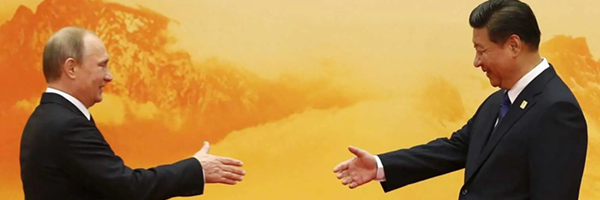Russia, China Reveal Their Global Agenda

Moon of Alabama, May 17, 2024 —
There will be more to say about the nearly 8,000 words long
Joint Statement of the People’s Republic of China and the Russian Federation on deepening the comprehensive strategic cooperative partnership in the new era on the occasion of the 75th anniversary of the establishment of diplomatic relations between the two countries (in Mandarin) (h/t Arnaud Bertrand).
But for now there are these two excerpts.
On multipolar global governance (machine translation):
The two sides pointed out that the great changes in the world have accelerated their evolution, the status and strength of emerging powers in the “global South” countries and regions have continued to increase, and the world’s multipolarization has accelerated. These objective factors have accelerated the redistribution of development potential, resources, opportunities, etc., developed in a direction conducive to emerging markets and developing countries, and promoted the democratization of international relations and international fairness and justice. Countries that embrace hegemonism and power politics run counter to this, attempting to replace and subvert the recognized international order based on international law with a “rules-based order”. The two sides emphasized that the concept of building a community of human destiny and a series of global initiatives proposed by China are of great positive significance.
As an independent force in the process of establishing a multipolar world, China and Russia will fully tap the potential of their relations, promote the realization of an equal and orderly multipolar world and the democratization of international relations, and gather strength to build a fair and reasonable multipolar world.
The two sides believe that all countries have the right to independently choose their development models and political, economic, and social systems in accordance with their national conditions and the will of the people, oppose interference in the internal affairs of sovereign countries, oppose unilateral sanctions and “long-arm jurisdiction” that have no basis in international law and are not authorized by the Security Council, and oppose ideological lines. The two sides pointed out that neocolonialism and hegemonism are completely contrary to the trend of today’s era, and called for equal dialogue, the development of partnership, and the promotion of civilized exchanges and mutual learning.
The two sides will continue to firmly defend the results of the victory of the Second World War and the post-war world order enshrined in the Charter of the United Nations, and oppose the denial, distortion and tampering with the history of the Second World War. The two sides pointed out that they must carry out correct historical education, protect the world’s anti-fascist memorial facilities from desecration or destruction, and severely condemn the glorification and even attempts to resurrect Nazism and militarism. The two sides plan to celebrate the 80th anniversary of the victory of the Chinese People’s War of Resistance against Japan and the Great Patriotic War in 2025, and jointly promote the correct view of the history of World War II.
The ‘Global South’, i.e. the majority of all countries, will very much welcome this.
On the war in Ukraine (machine translation):
The Russian side positively evaluates China’s objective and fair position on the Ukraine issue, and agrees with the view that the crisis must be resolved on the basis of full and complete compliance with the Charter of the United Nations.
The Russian side welcomes China’s willingness to play a constructive role in resolving the Ukrainian crisis through political and diplomatic channels.
The two sides pointed out that they must stop all actions that have caused the delay of the war and the further escalation of the conflict, and called for the crisis to be avoided from spiraling out of control. The two sides emphasized that dialogue is a good way to resolve the Ukrainian crisis.
The two sides believe that in order to steadily resolve the Ukrainian crisis, it is necessary to eliminate the root causes of the crisis, abide by the principle of indivisibility of security, and take into account the reasonable security interests and concerns of all countries.
The two sides believe that the destiny of all peoples is shared, and no country should seek its own security at the expense of the security of other countries. The two sides expressed concern about the real challenges of international and regional security and pointed out that in the current geopolitical context, it is necessary to explore the establishment of a sustainable security system in the Eurasian space based on the principle of equality and indivisibility of security.
